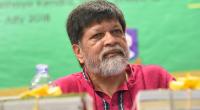 After the BNP-Jamaat alliance took office in 2001, the then-Bangladesh Ambassador to US Tariq A Karim received his marching order. To his surprise, he received another order from Dhaka to set an appointment for the newly-appointed Foreign Minister AQM Badrudozza Chowdhury with US Secretary of State Colin Powell.
After the BNP-Jamaat alliance took office in 2001, the then-Bangladesh Ambassador to US Tariq A Karim received his marching order. To his surprise, he received another order from Dhaka to set an appointment for the newly-appointed Foreign Minister AQM Badrudozza Chowdhury with US Secretary of State Colin Powell.
Puzzled, he called the foreign ministry and asked what he should do and was told to go ahead and fix the appointment.
The meeting of the foreign ministers was eventually fixed and the first question Powell asked his Bangladeshi counterpart, “Why did you form an alliance with Jamaat?” and the response was “We want to control the party and that’s why we have kept them on our side.”
No doubt, Collin Powel had done his homework about the situation in Bangladesh before the meeting, Karim said. The most horrific terrorist act that destroyed the World Trade Centre in New York had changed the global dynamics.
The most horrific terrorist act that destroyed the World Trade Centre in New York had changed the global dynamics.
When I heard the speech of President Bush on September 11 and, when he said ‘We are going to hunt down the terrorists wherever they are’, I immediately realised it had far reaching implications and would have an impact on Bangladesh, a Muslim majority country, said Karim.
On Sept 12, 2001, the UN Security Council strongly condemned the terrorist act and passed a resolution.
Bangladesh, being a member of UNSC that time, made a statement. Bangladesh representative Shameem Ahsan said (as quotes in the UN record): my “country was still shocked by the very heavy human toll and material losses that occurred yesterday in the United States. His Government had already strongly condemned the terrorist act. Today, he wished to express condolences to the people and Government of the United States. Bangladesh also fully supported the terms of the draft resolution to be adopted.”
Bangladesh representative Shameem Ahsan said (as quotes in the UN record): my “country was still shocked by the very heavy human toll and material losses that occurred yesterday in the United States. His Government had already strongly condemned the terrorist act. Today, he wished to express condolences to the people and Government of the United States. Bangladesh also fully supported the terms of the draft resolution to be adopted.”
The political relationship was more or less stable for the next one year, but Bangladesh was disappointed when it was included in the US special registration programme for vigilance against terrorism.
It was knee-jerking reaction from the United States, said Karim, who left the embassy in January 2002. The US had adopted the approach of ‘It's better to be safe than sorry’.
It was a disappointment for Bangladesh, but the government had taken a realistic approach to have the decision retracted. Diplomats who worked in Bangladesh mission in Washington during that period said they worked day in day out and engaged with the US administration, legislative and civil society to get Bangladesh out from the list of 25 pre-dominantly Muslim countries except North Korea.
Diplomats who worked in Bangladesh mission in Washington during that period said they worked day in day out and engaged with the US administration, legislative and civil society to get Bangladesh out from the list of 25 pre-dominantly Muslim countries except North Korea.
The interesting part is Washington had never disengaged with Dhaka; rather, some of them were sympathetic to the country.
Bangladeshi diplomats had a series of meetings with officials of US State Department , Homeland Security, Justice Department, Pentagon, National Security Council and other agencies.
They also met senators and congressmen on a regular basis and explained to them that Bangladesh was a moderate and tolerant Muslim country.
In the meetings with the US administration, they always raised their concern about Madrassah based education while Bangladesh side argued that there was no evidence that Madrassah and terrorism are connected.
The US wanted Bangladesh to join the peacekeeping operations in Iraq, but Bangladesh never agreed.
 Others
Others
41387 hour(s) 9 minute(s) ago ;
Morning 06:04 ; Monday ; Jul 07, 2025
BNP faced US questions over Jamaat ties after 9/11
Send
Sheikh Shahariar Zaman
Published : 12:30, Sep 11, 2018 | Updated : 19:05, Sep 12, 2018
Published : 12:30, Sep 11, 2018 | Updated : 19:05, Sep 12, 2018
0 ...0 ...
/ssz/tf/up-pdn/
Topics: Top Stories
- KOICA donates medical supplies to BSMMU
- 5 more flights to take back British nationals to London
- Covid19: Rajarbagh, Mohammadpur worst affected
- Momen joins UN solidarity song over COVID-19 combat
- Covid-19: OIC to hold special meeting
- WFP begins food distribution in Cox’s Bazar
- WFP begins food distribution in Cox’s Bazar
- 290 return home to Australia
- Third charter flight for US citizens to return home
- Dhaka proposes to postpone D8 Summit
Unauthorized use of news, image, information, etc published by Bangla Tribune is punishable by copyright law. Appropriate legal steps will be taken by the management against any person or body that infringes those laws.
Bangla Tribune is one of the most revered online newspapers in Bangladesh, due to its reputation of neutral coverage and incisive analysis.
F R Tower, 8/C Panthapath, Shukrabad, Dhaka-1207 | Phone: 58151324; 58151326, Fax: 58151329 | Mob: 01730794527, 01730794528


